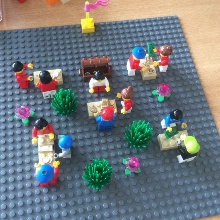Didactic concept
We regularly offer topics for theses based on ongoing projects and doctoral projects. If you are interested in supervising a thesis, please refer to the FAQ listed below.
In order to make the learning contents vivid and tangible and thus ensure lasting learning success, we use creative and playful elements. Such approaches from the field of Game-Based Learning can promote not only specialist knowledge but also interdisciplinary skills such as teamwork, creativity, strategic action planning, logical thinking and presentation skills.
Courses
The department offers courses related to technology-enhanced education, ethical aspects of AI and data in education and simulation science, psychological foundations of teaching and learning, children as target-group of technology development, dealing with heterogeneity and diversity, and computer science teacher education. Our portfolio spans courses in both English and German.
In summer semester 2025 we offer the following courses:
- AI and Data in Education: An Ethical Reflection (Seminar; Dozentin: Jun.-Prof. Dr. Maria Wirzberger; language of instruction: English)
- Introduction to Programming Languages for Educational Technologies (Seminar; Dozent: Dipl.-Inf. Christian Dittrich; language of instruction: German/English)
- Von Fake News, DeepFakes und Reflexion als Superkraft: Vermittlung kritischer Reflexion intelligenter Systeme im Unterricht (Seminar; Dozentinnen: M. A. Tabea Berberena, Jun.-Prof. Dr. Maria Wirzberger; language of instruction: German)
- Digitale Kompetenzen und innovative Lehrmethoden: Vermittlung komplexer technischer Themen an Schülerinnen und Schüler (Seminar; Dozierende: M.Sc. Christian Pfaendner, Jun.-Prof. Dr. Maria Wirzberger; language of instruction: German)
- Vertiefung der Fachdidaktik Informatik (Seminar; Dozent: Dr. Kensuke Akao; language of instruction: German)
- Vertiefung zur Einführung in die Fachdidaktik der Informatik (Seminar; Dozentinnen: M.Ed. Ann-Kathrin Kapfenstein, Jun.-Prof. Dr. Maria Wirzberger; language of instruction: German)
Theses
We regularly offer topics for theses based on ongoing projects and doctoral projects. If you are interested in supervising a thesis, please refer to the FAQ listed below.
If you are interested, you are welcome to contact us!
FAQ
The department supervises master's theses in the educational sciences for teaching degree programs as well as bachelor's and master's theses in the computer science programs, especially the teaching degree programs.
We only supervise two types of theses, those focusing on the development of software and/or algorithms and those focusing on the planning, implementation and inferential statistical analysis of an empirical study. We do not supervise purely conceptual or theoretical theses.
Theses with a focus on “software development” require solid knowledge of programming in Python, Unity or Javascript, depending on the task.
Theses with a focus on “empirical studies” require skills in empirical experimental design and statistical data analysis in R. The use of menu-based tools such as SPSS is not supported in our department. To promote transparent research, we analyze data exclusively script-based, preferably in R.
No, for capacity reasons we only supervise theses on topics advertised by us that are linked to ongoing research projects and doctorates. In addition to the theses advertised by us, corresponding capacities can be inquired at the respective project staff or doctoral researchers.
No, we have no capacity for this type of theses.
Theses are generally written in English because they contribute to international scientific publications due to the embedding in project-related or doctoral research. Exceptions are only possible in justified cases after consultation with us.
At the moment, our available capacities are already occupied with ongoing theses. Open topics will be advertised here as soon as they become available.


